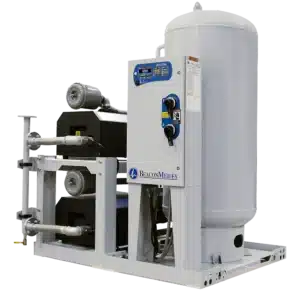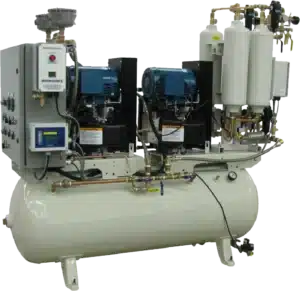Manifold gas systems are a highly beneficial asset to any medical institution and healthcare facility. Used to dispense many gasses simultaneously, an oxygen manifold system installed in a facility serves multiple purposes, from supporting patients in surgery to aiding post-operative care.
The benefits accruing from the use of Oxygen have been long known, but it has also been recognized as the most inappropriately administered drug, like any other medication or compound. Like any other drug, Oxygen needs to be administered carefully at the appropriate dose.
Unmonitored and unrestricted administration can be potentially harmful and even put a patient’s life at stake.
Typically, gas cylinder manifold systems consist of large gas cylinders used to supply gasses via a pipeline to a building such as a hospital. These groups of cylinders are often arranged in two groups: primary and secondary. In most cases, the size J cylinders are commonly used, which usually can hold 6800 liters of Oxygen each or 13 600 nitrous oxide.
Oxygen manifold system is used to achieve the following purpose:
- Regulator
- Flowmeter
- Blender
- CPAP
- Ventilator
- Humidifier
- Nasal cannula and catheter
- Masks and tubing
- Pulse oximeter
- Multiparameter monitor
A comprehensive oxygen system consisting of the source-to-patient monitoring and support systems of power supply and maintenance is also used for therapeutic purposes. However, it’s vital for medical facilities to ensure that the system is installed away in an area separate from the building, not be exposed to the environment, and is highly well ventilated.
Considering the number of options available in the market, it’s essential to keep your requirements and the purpose they can serve in your mind. Here are a few things to consider:
- Assessing whether you need a concentrator or a cylinder
- Size and capacity of cylinder based on your use
- Access to get it refilled easily
- Maintenance and upkeep requirements
Proper installation is of utmost importance. Any leakage, valve failure, damage to the alarm system, or any other system component from source to the patient can put an individual’s health at risk and threaten the safety of the facility.
Complications with inappropriate use of Oxygen can be both direct and indirect.
High oxygen concentration tends to cause tissue damage and organ failure with characteristic oxidative stress and oxygen radical production. It exposes one’s body to the risk of cytotoxicity and functional impairment. It can exacerbate a patient’s respiratory disease and be a powerful irritant.
The damage induced in type 1 and type 2 pneumocytes increases alveolar permeability, increasing the risk of lung collapse. Alveolar surface instability also triggers atelectasis development. The changes associated with atelectasis development are also a predisposition towards pneumonia.
The installation of gas cylinder medical systems in both invasive and non-invasive use-cases must be implemented in a logical, progressive, and gradual manner with proper evaluation of the pros and cons of the treatment. Your approach to installation must consider whether a patient requires supplemental Oxygen or artificial ventilation. Apart from reducing the detrimental health side-effects of administration, it will help substantially reduce medical costs.


